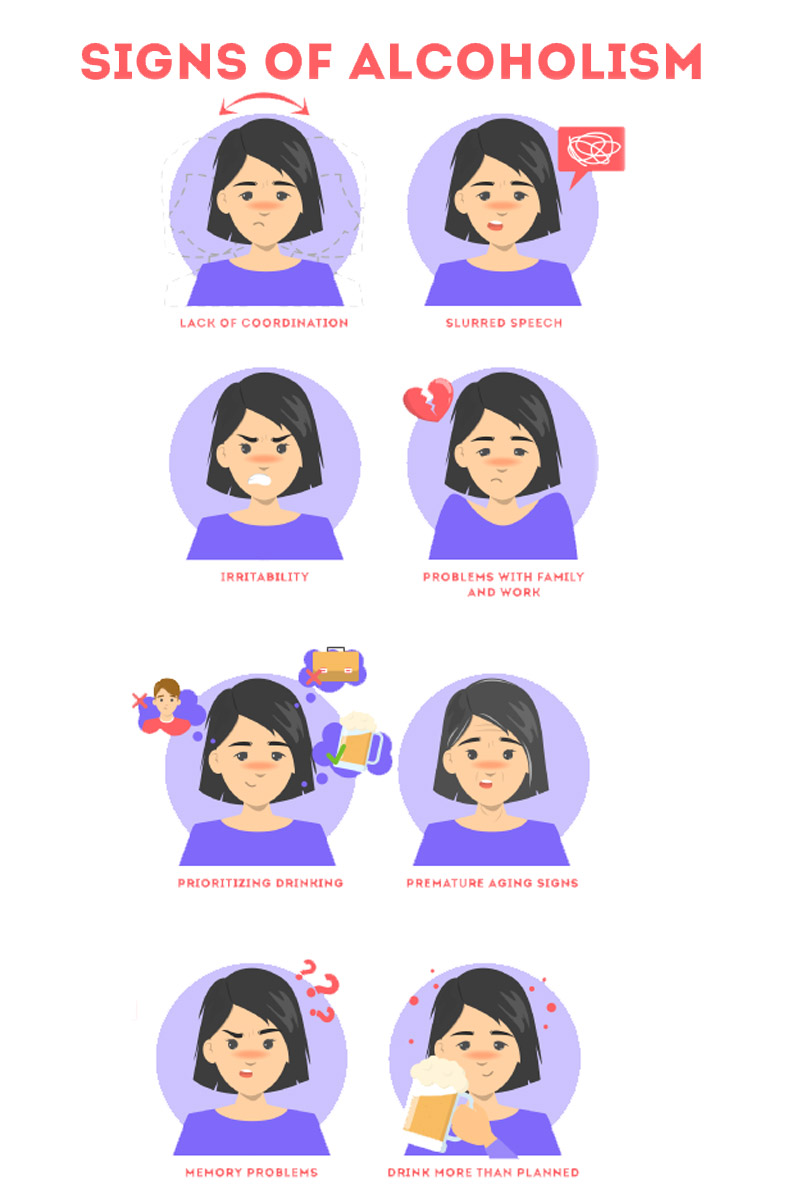Alcohol Addiction (Alcoholism)
An alcohol addiction has a profound impact on the lives of the individual and their loved ones. When you understand addiction and the steps to overcome alcohol dependence, it becomes easier to make informed choices, overcome alcohol problems and work towards a life of sobriety. Fortunately, you don’t have to do it alone. The following guide takes an in-depth look at the signs & symptoms of alcoholism and alcohol abuse, its risk factors, and the options for alcohol addiction treatment.
What is an alcohol addiction (alcoholism)?
An alcohol addiction is defined as the frequent and uncontrolled use of alcohol over a prolonged period owing to a physical and psychological dependence. Also referred to as alcoholism or an alcohol dependence, symptoms involve the continuous use of alcohol despite a negative impact on health, relationships, and issues with the law.
Alcoholism often stems from alcohol abuse as drinking habits become unmanageable. An alcohol dependence can range from mild to moderate and severe. The more frequently alcohol is consumed and the greater the volume over time, the higher the risk of an addiction alcohol use disorder with serious health and mental health problems such as liver disease (PubMed Central, 2014) and mental disorders (Alcohol Research & Health, 2002) with health complications.

Alcohol addiction & abuse
An alcohol abuser is an individual who may drink too much and too frequently whether at a social gathering or an event. While they may seek the use of alcohol and its intoxicating effects, they can stop drinking alcohol when they want to.
An alcohol addiction or dependence occurs when an individual drinks too much, too often, and is unable to quit. Their drinking habits or alcohol abuse can lead to health risks, compromise personal relationships, and create legal problems; however, they are still unable to manage their alcohol use..
According to the UK alcohol consumption guidelines, alcohol intake is restricted to 14 units weekly for men and women. This is equal to drinking less than 6 pints of beer with a 4% ABV or 7 medium glasses of wine at a 12% ABV (NHS, 2020).
How alcohol addiction develops
Alcohol dependence is considered a complex addiction owing to the involvement of multiple factors in alcohol abuse and alcohol dependence cases. Healthline (2020) indicates that alcohol causes chemical changes in the brain with repeated alcohol misuse. This process increases the occurrence of tolerance. Individuals are compelled to drink increased amounts of alcohol in response to a tolerance leading to chronic alcohol abuse.
After some time, the initial intoxication of alcohol wears off and individuals remain in a cycle of dependence to subdue alcohol withdrawal symptoms. Repeat exposure, trauma, and hereditary and other environmental factors are common causes of alcohol dependence. We explore these causes in more detail.
Repeat Exposure
For those who binge drink alcohol or who do not manage their alcohol intake, the risk of an addiction is higher compared to those who control or do not indulge in excessive drinking. Repeat exposure is a process that increases risk of an alcohol addiction as the body develops a tolerance. You need more alcohol each time you drink to achieve its intoxicating effects. While tolerance and repeat exposure can risk alcohol dependence, factors such as mental health and family history must be considered in maintaining an addiction.
Trauma & Pre-existing Mental Health Conditions
A psychological trauma involves an emotional response to an event that disrupts one’s coping abilities and overall well-being. As alcohol creates a pleasurable experience when intoxicated, the sufferers of trauma who wish to numb or escape their memories and psychological pain are at greater risk of an alcohol dependence (Maryland Recovery, 2017).
Common mental health conditions that are comorbid with alcoholism include mood disorders, generalised anxiety, depression, bipolar, and chronic stress (BMC Psychiatry, 2011). When a mental health condition exists with a substance abuse problem, this is commonly referred to as a dual diagnosis according to the Diagnostic and Statistical Manual (DSM-V). A psychological disorder makes it difficult to cope with daily challenges and comes with a unique set of symptoms. Many people rely on the use of recreational substance use including alcohol to manage these symptoms. When compounded by an alcohol addiction, the other mental health issues go without treatment and both disorders worsen (HelpGuide, 2020).
A Family History of Alcoholism
Biology can play a major part in developing an alcohol addiction. It can also influence the process of recovery. For those with a genetic predisposition to addictive behaviours, including alcohol use, certain chemicals in the brain are sensitive to the intoxicating and pleasurable effects produced by alcohol consumption. Individuals experience the need to consume more alcohol, more frequently to achieve the desired effect. Such cravings can include a hereditary basis and increase risk of an alcohol addiction.
Enter your phone number below and one of our qualified addiction specialists will get in touch to discuss your options.

Signs & Symptoms of Alcoholism
An alcohol addiction is characterised by an inability to control the amount of alcohol consumed. Individuals craving alcohol simply cannot quit drinking on their own.
They may try to conceal their habit by drinking in private or becoming increasingly self-isolated. Changes in behaviour, mood disturbances, problems at work and health complications may indicate the presence of an alcohol addiction.
Along with the signs of an alcohol addiction, the symptoms of alcohol dependence should be considered
People dependent on alcohol experience physical symptoms of alcohol addiction:
- Mood disruptions, irritability, and agitation.
- Experiencing hangovers without drinking.
- Lapses in memory and poor impulse control.
- Changes in friends and social hangouts.
- Blackouts.
- Disregarding responsibilities and choosing alcohol.
- Justifying alcohol consumption to relax or relieve stress.
- Mental health problems
Diagnosing Alcohol Addiction
The Four Stages of Alcoholism
We take a closer look at the 4 stages of alcohol addiction and the steps you can take to seek the alcohol treatment you need.
Stage 1 – Experimentation
During this stage, individuals may binge drink or experiment with the use of alcohol. It is commonly noted in youth along with peer pressure. Experimentation does not mean that you will develop a tolerance or an addiction. If your drinking habits are best described by the remaining stages, there could be cause for concern.
Stage 2 – Alcohol Abuse
Ongoing alcohol consumption beyond the NHS guidelines is considered the first sign of alcohol abuse and alcoholism.. Drinking alone, hiding drinking habits, or using alcohol to alleviate stress, anxiety and emotional difficulties are signs of alcohol abuse. The more alcohol you consume, the greater the risk of developing an alcohol tolerance.
Stage 3 – Habitual Drinking
By stage 3, many alcohol users find themselves drinking excessive alcohol frequently and in larger amounts. This will start to impact your health and emotional state. Stage 3 alcohol use is determined by the symptoms of insomnia, mood changes, and difficulty maintaining personal relationships.
Stage 4 – Dependency
By the final stage, individuals have developed a psychological and a physiological dependency on alcohol. It is during this time that you will start to suffer from the symptoms of a withdrawal should you try to reduce or quit the consumption of alcohol. Symptoms range from tremors to hallucinations, and possible seizures.

The Dangers of Alcohol Addiction
An alcohol addiction increases the risk of disruptions across your personal and professional life, including your health.
An alcohol dependence can become life threatening when you pursue an alcohol detox.
When you detox from alcohol, you may experience withdrawal symptoms. Individuals who are dependent on alcohol can suffer tremors, nausea, headaches, hallucinations, delirium, and seizures. Owing to the risk of health complications involved in alcohol addiction, seeking the right treatment can prevent life threatening circumstances. Individuals with alcoholism who try to quit drinking, can suffer cardiac arrest as the brain and body adjust to the absence of alcohol. Addictions also negatively impact the ability to function which includes mood disturbances, confusion, poor stress management, and ailing health.
Alcoholism in Pregnancy
The consumption of alcohol during pregnancy risks the development of Foetal Alcohol Syndrome. Medical practitioners are unable to determine the amount of alcohol responsible for physical and mental anomalies and therefore abstaining from alcohol while pregnant is advised. Foetal Alcohol Syndrome occurs when the unborn foetus is exposed to alcohol during critical growth stages. Babies are born with distinct facial abnormalities and mental disabilities.
The Impact of Alcoholism on Family
Many believe that alcoholism is an individual disease, but this could not be further from the truth. Alcohol addiction affects entire families. As relatives watch the person they love suffer from the grip of an addiction, they feel powerless to help them. Families and communities are torn apart by addictions or substance abuse.
According to the Department of Health, the NHS spends an average £3.5 billion to address alcohol-related issues.
Is Alcohol Addiction a Disease?

Getting Help for Alcohol Addiction
If you are affected by an alcohol addiction or know a loved one suffering from alcohol dependence or chronic alcohol misuse,, it is important to act by seeking the necessary help before it is too late.
An alcohol addiction will not only cause major upheavals in everyday life but also increase risk of withdrawal symptoms with serious health consequences where a dependency has developed.
To facilitate a safe alcohol detox and recovery from withdrawal symptoms, alcohol dependents are advised on seeking residential alcohol rehab or via the various outpatient services that are free. Programmes overseen by the NHS provide free outpatient services, for alcohol related problems, helping alcohol dependent individuals receive the therapy and support needed on a journey to sobriety. Alternatives include the attendance of a private rehab where patients are provided 24/7 medical supervision. Support services include the use of medication to relieve dangerous and painful and severe withdrawal symptoms from alcohol.
All alcoholics can benefit from addiction counselling and support groups like Alcoholics Anonymous. Addiction counselling explores the underlying causes for alcohol use. Therapy introduces coping strategies and helps you build essential skills to apply in real world settings. Programmes are led by a certified practitioner and focus on transformation in attitude and behaviour to work towards sober living.
If you are interested in making a profoundly positive change by focusing on sober living, we encourage you to speak to our professional team. We will guide you on the steps you can take to get the help you need to recovery from from alcoholism and alcohol abuse.
You may have a lot of questions about alcohol addiction and alcohol use disorder. If you are unable to find the answer below, please give us a call and speak to one of our addiction specialists today.
According to National Institute on Alcohol Abuse and Alcoholism (NIAAA), binge drinking alcohol corresponds to taking 5 or more alcoholic drinks for males and 4 or more drinks for females within 2 hours. While taking more than 4 alcoholic drinks in a single day by males and more than 3 drinks by females is described as heavy drinking.
When you consume alcohol, it travels through your body and enters your bloodstream. Alcohol affects the brain and nervous system, making you feel relaxed, euphoric, or even sedated. Generally speaking, it takes about three months of heavy drinking for an alcoholic to develop alcohol dependence.
The more frequently you drink, the more likely you’ll become dependent on alcohol. This can be especially true if you’re also young when you start drinking heavily and/or binge drinking.
If you find yourself drinking excessive alcohol or experiencing withdrawal symptoms when you try to quit and you are developing physical, emotional and other mental health problem as a result, you may suffer from alcohol abuse or alcohol use disorder.
If you’re concerned about your heavy drinking habits or excessive alcohol use, consider talking to a professional who can help diagnose any potential alcohol abuse issues and recommend addiction treatment options.
If you know someone who has an alcohol addiction, or if you are struggling with an addiction yourself, it’s important to know what to do. The first thing to understand is that your friend or family member needs help—and help is available.
The best way to help is by getting educated about the signs and symptoms of alcohol abuse and its harmful consequences so you can then take steps to help your loved one. There are many addiction treatment options available to treat alcoholism.
